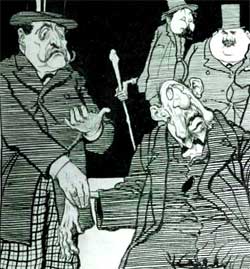
Written by M. Williams, Ph.D. (more about author)
What is Hypochondria?
Hypochondria or hypochondriasis, is a psychiatric illness or health anxiety. Hypochondria involves a preoccupation with fears of harboring a severe physical disease. Hypochondriacs persist in their preoccupation despite medical evaluation and reassurance, personal distress, and interference with work or relationships. For a diagnosis, symptoms must last at least six months, and, for over half of patients, symptoms last two years or more.
Hypochondria is considered a somatoform disorder, a class of psychological disorders that involve reports of physical symptoms from a patient, despite the inability of a physician to find any medical cause.
It is believed that unconscious psychological conflicts become translated into physical problems or complaints, outside of the patient's conscious awareness. Hypochondriasis is not to be confused with disorders in which an individual intentionally fakes a physical illnesses for attention or to avoid punishment (malingering).
Common Symptoms of Hypochondria
People with Hypochondria may have the following symptoms:
- Excessive worry about having a severe physical disease.
- Preoccupation with bodily functions, sensations, or performance.
- Obsessive rumination with intrusive thoughts about condition.
- Ideas and fears of having an illness that cannot be easily stopped.
- Extreme suggestibility, for example a person may become alarmed at the slightest hint of illness, or even from reading about a disease, knowing someone who becomes sick, etc.
- Extensive fascination with medical information. For example, the person may read medical books or journals, watch television programs about health or medicine, be preoccupied in news about health, etc.
- Unrealistic fears of being infected or contaminated by something touched, something eaten, or contact with another person.
- Excessive health-preserving behavior, for example eating only certain health food, intensive exercise, or overdoing things to keep fit.
- Over-focus on the possible cause of symptoms. For example the patient needs an explanation for the symptoms and is more concerned about the meaning of the symptoms than the distress they cause.
- Fear of taking prescribed medication.
Hypochondria and Anxiety Disorders
Many patients with anxiety disorders suffer from medically unexplained bodily symptoms. Patients are often preoccupied with how their body is functioning and may catastrophically misinterpret normal physical sensations. Anxiety disorders such as generalized anxiety disorder, panic disorder, and even depression, are often associated with hypochondriacal complaints. There is an overall agreement that hypochondria and panic disorder are related, but the exact nature of the relationship remains unclear. Both disorders involve many similarities, including hyper-focus on body sensations and overuse of health services.
Hypochondria has some overlapping similarities to obsessive-compulsive disorder, most notably obsessive concerns about bodily harm and contamination. "Obsessive rumination" is a prominent symptom for many patients with hypochondriasis, and fears of being infected or contaminated are also prominent with OCD. This raises the question of whether hypochondriasis should be viewed as an OC spectrum disorder, an illness closely related to OCD.
The difference between hypochondria and OCD, however, is that hypochondriacs fear having a disease while people with OCD fear getting a disease. Even so, both groups have obsessions, compulsions to check, and are not convinced by repeated reassurance.
Treatment for Hypochondria
Treatments for many anxiety disorders are also effective for hypochondria, most notably cognitive-behavior therapy. Antidepressant serotonin reuptake inhibitors also seem to be effective.
Sources:
- Per Fink, Eva Ornbol, Tomas Toft, Kaj Christensen Sparle, Lisbeth Frostholm, and Frede Olesen. A New, Empirically Established Hypochondriasis Diagnosis. Am J Psychiatry, 161:1680-1691, September 2004.
- M Bach, DO Nutzinger, L Hartl. Comorbidity of anxiety disorders and hypochondriasis considering different diagnostic systems. Comprehensive Psychiatry, Vol 37(1), Jan-Feb 1996. pp. 62-67.



